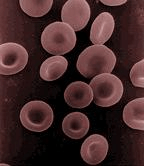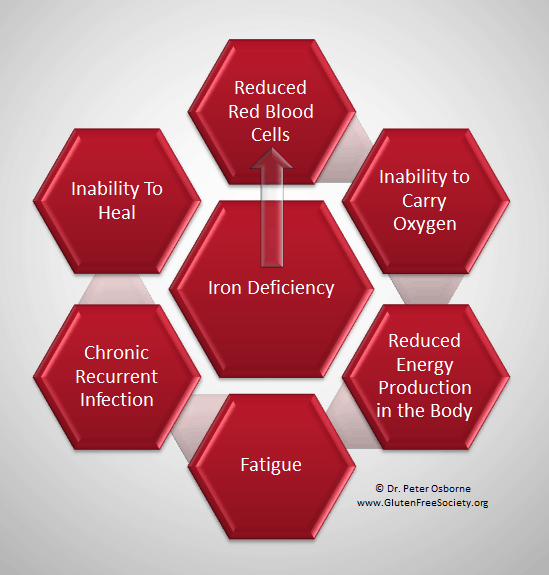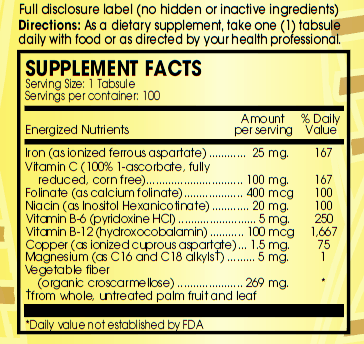new to the gluten free journey?
Ultra Iron — Gluten-Free Nutritional Supplement
Iron is a common deficiency for Those With Gluten Sensitivity
One of the Most Common Nutritional Deficiencies for Those With Gluten Sensitivity, Iron Can Help Support More Energy, Immune Function, Mental Clarity, and Prevent Anemia. Are You Deficient?
Iron deficiency is one of the most common nutritional deficits found in patients with celiac disease and non celiac gluten sensitivity. The most common symptom linked to iron deficiency is unwavering fatigue. Patients will often report severe loss of energy even when sleep has been adequate. This energy deprivation can also contribute to severe brain fog and mental clarity issues. Iron deficiency can often times be confused with low thyroid or hypothyroidism.
Iron loss can contribute to a multitude of health problems – not just fatigue. Some of the most common side effects of iron deficiency include:
- shortness of breath (people often report that they cannot get enough air into their lungs)
- irritability
- extreme fatigue (people commonly report sleeping for 8 + hours and still waking up exhausted)
- chronic recurrent infections (cold and flu)
- craving ice
- hair loss
- headaches
- weakened nails
- restless legs syndrome
- angular stomatitis (cracking in the corner of the lips)
- chapped lips
- easy bruising
Research Shows Iron Deficiency Linked to Gluten Exposure
 The following research study published in the Turkish Journal of Gastroenterology discusses how iron deficiency can be the first symptom associated with celiac disease. The results of the research led to the recommendation of ruling out gluten sensitivity in all patients with iron deficiency anemia. The study additionally recommends this screening in patients who supplement with iron, but still have persistently low levels (refractory iron deficiency).
The following research study published in the Turkish Journal of Gastroenterology discusses how iron deficiency can be the first symptom associated with celiac disease. The results of the research led to the recommendation of ruling out gluten sensitivity in all patients with iron deficiency anemia. The study additionally recommends this screening in patients who supplement with iron, but still have persistently low levels (refractory iron deficiency).
Source:
Turk J Gastroenterol. 2012;23(5):490-5.
Bottom line: if you suffer with any of the symptoms listed below for unknown reasons. You should have your doctor do two things –
- Order an iron panel with ferritin
- Rule out gluten sensitivity
What You Should Know About Gluten and Iron Deficiency
Gluten can contribute to iron deficiency in several ways. Malabsorption of iron is often a consequence of villous atrophy. Additionally, gluten can damage the acid producing cells of the stomach. Since acid is a necessary component for iron absorption, this commonly leads to anemia even in the absence of villous atrophy identification. Anemia leads to oxygen deficiency which in turn can reduce the body’s ability to generate energy, which in turn can cause a cyclic state of healing inhibition.
Aside from gluten induced damage, iron deficiency can occur in menstruating women with heavier periods. Iron deficiency can also occur when there is slow steady blood loss. This can occur in a hidden manor (occult blood loss) or it can be more obvious as in the case of hemorrhoids.
Iron is an essential element in the formation of lactoferrin, a protein used by the immune system to help fight gastrointestinal infections. This includes viral, bacterial, fungal, and parasitic infections. This is critical because in the presence of persistent GI infection, leaky gut syndrome is allowed to perpetuate regardless of a gluten free diet change. Additionally, the protein lactoferrin aids in both growth and in some studies has shown cancer protective qualities.
That is why I designed Ultra Iron. This high potency blend of iron is designed for maximal absorption (even for those with GI damage). It contains cofactors that help aid the body in absorption, uptake, and utilization by the cells. Many iron supplements cause constipation. This formulation was designed to reduce this detrimental side effect.
Ultra Iron works to:
- Restore depleted iron levels caused by gluten induced GI damage
- Support proper red blood cell formation – aiding in oxygen delivery throughout the body
- Support immune balance
Specialized ingredients For Gluten Sensitivity
- Ionized iron in a chelated form to reduce the chance for constipation
- B-Vitamins to help with iron uptake and utilization
- Vitamin C to enhance absorption
No other iron formulation provides this combination of nutrients for the gluten sensitive community.
==>> Order Now <<==
==>> Order Now <<==
FAQ
- What is the recommended dose? 2-4 capsules daily is the recommended dose for adults. Always take this supplement with food.
- Is Ultra Iron safe during pregnancy? Yes, but you should always consult your doctor.
- Is Ultra Iron safe for children? Yes, but iron supplementation in children should be monitored by a qualified doctor.
- Are there any common allergens in Ultra Iron? No
- How many pills are in each bottle? 100
Drugs/Medications That Deplete or Interfere With Iron
Ibuprofen, and other non-steroidal anti-inflammatory drugs (NSAIDS) can cause gastric and intestinal bleeding allowing for the slow loss of iron over time. People who take these pain reducing medications regularly should have their iron levels monitored.
Food Sources for Iron
Iron deficiency can be challenging to overcome for some. The following are excellent food sources to help with iron loss – Liver, beef (including broths), pumpkin seeds, almonds, pine nuts, hazel nuts, spinach, chard, artichoke, eggs (yolk), and prunes.




